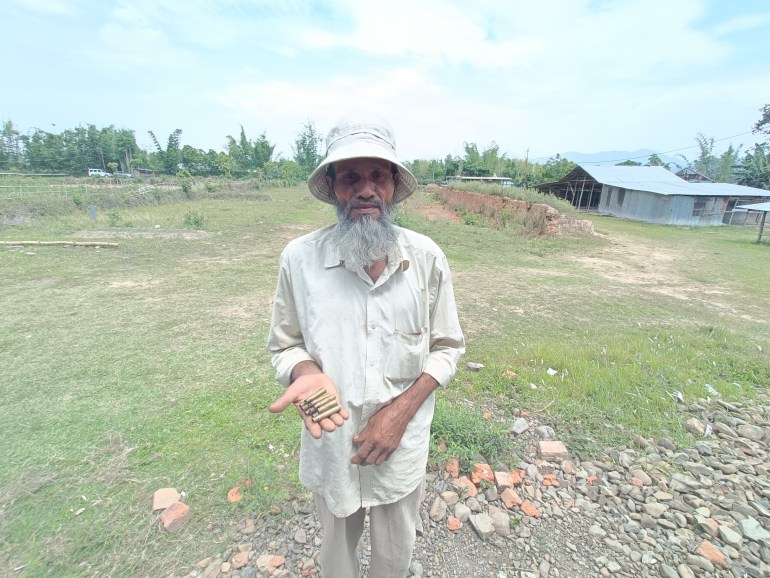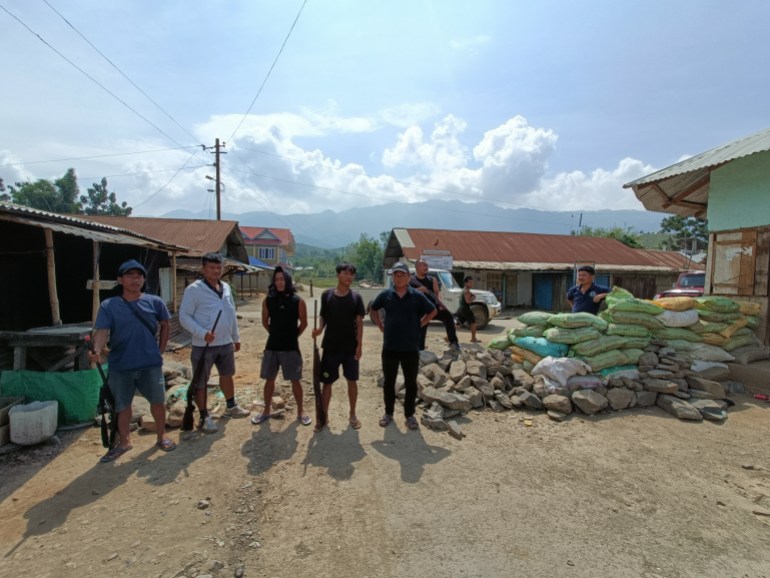Manipur, India – Samim Sahni was sitting outside her brick house last week, hunched over a radio along with a dozen of her neighbours, listening to the 7.30pm news broadcast when they heard a bullet whiz by.
The 25-year-old mother of two children – a seven-year-old son and a toddler daughter – rushed inside her house in Kwakta town of Manipur state’s Bishnupur district in northeastern India.
Chaos ensued and others who had gathered to hear the news began running helter-skelter even as the firing continued.
“We hid behind the bed for some time. Then between 10.30pm and 11pm we got out and went and hid in the mosque. We only got back in the morning,” she told Al Jazeera.
After returning to her house, Sahni and her husband noticed half a dozen bullet holes lining the side of the entrance to their house.
“We didn’t want to come back but we don’t really have a choice,” said Sahni.

According to the authorities, nearly 100 people have been killed, 310 injured and more than 40,000 have been displaced in Manipur since May 3 as the remote Indian state witnessed ethnic clashes between the mainly-Hindu Meitei community and the Kukis who are mostly Christian.
The Meitis – who constitute about half of Manipur’s population of 3.5 million, as per India’s last census conducted in 2011 – are largely based in and around the state capital Imphal.
The Kukis, along with another major tribe, the Nagas, form around 40 percent of the state’s population and mostly live in the hills. They enjoy the Scheduled Tribe status, a constitutional provision that protects the rights and livelihoods of some of India’s Indigenous communities.
The violence was triggered by a Kukis-led protest against the Meiteis demanding to be designated as a Scheduled Tribe.
Caught between two sides
Sahni’s village had been caught in the crossfire between the Meitei-dominated area of Kwakta and a nearby Kuki village.
Sahni and her husband are among around 8,000 Muslims inhabiting Kwakta, according to the 2011 census. Local estimates say there could be as many as 20,000 members of the community, known as Meitei Pangals, in the area.
At about 8 percent, the Meitei Pangals are the fourth largest community in Manipur after the Meiteis, Nagas and Kukis. They live in and around Imphal.
The area under the Kwakta Municipal Council consists of nine administrative wards, located close to the Kuki-dominated Churachandpur district, one of the 10 hill districts of Manipur.
“We [Meitei Pangals] live in the valley areas. We have a relationship with both the Kukis and the Meiteis… Since the incidents started happening, we have been facing pressures from both sides,” S M Jalal, president of the All Manipur Muslim Organisations Coordinating Committee (AMMOCOC), the apex civil society organisation of the Pangal community, told Al Jazeera.

Violence in Manipur erupted on May 3 following a peace rally in Churachandpur against a host of issues, including the demand by Meitei groups to be included in the list of Scheduled Tribes, which would accord the community access to grants and reservations in educational institutes and government jobs.
“After the riots started from Torbung, Kangvai and other surrounding villages [located at the border of Churachandpur and Meitei-dominated Bishnupur district], hundreds of Meiteis came down from Churachandpur. Several of them took shelter in Muslim houses in Kwakta,” Nasir Khan, president of the Bishnupur-based Meitei Pangal Intellectual Forum, told Al Jazeera.
The Kwakta Municipal Council helped in setting up relief camps for the Meiteis fleeing the violence in the neighbouring district.
Pitrubi Bibi, 65, was among those who gave shelter to about 100 people.
“My daughter-in-law is a Meitei, so a lot of them who came are her relatives. There were 20 children among this group, slowly a lot of them left for other areas,” Bibi said.
On 1 June, Bibi’s 30-year-old son Mohammad Yashir, who works as a field officer with Manipur’s sericulture department, was beaten up allegedly by a Meitei mob in Imphal when he came to the city to help retrieve a car belonging to the family of a Kuki senior in his department.
“About six-seven people surrounded my car and started beating me up. They started saying Muslims are helping the Kukis… I tried to tell them that I had helped Meiteis flee Churachandpur at the start of the violence. It didn’t matter,” Yashir told Al Jazeera.
Neighbours at war
The Meitei Pangals living in Ward 8 of Kwakta Municipal are literally in the crossfire between the Kukis and the Meiteis.
Between 50-60 Meitei Pangals live between Pholjang, a predominantly Kuki village on the foothills of Thangjing Hill and the Meitei-dominated Ward 9 in Churachandpur.
“Since May 3, firing has happened three-four times. We leave our houses every evening and stay in nearby areas,” Mohammed Razauddin, a resident of the ward, told Al Jazeera.

Md Karimuddin, an elected councillor from the ward, Azad Khan, said a low-intensity bomb was found next to a Meitei Pangal house in Islamabad area of Ward 8 on Monday. When Al Jazeera visited the spot on June 1, the alleged bomb had been removed, although a large dent could be seen in the ground and the wall of the concrete yellow house was visibly hit by small debris from the explosion.
“Three days back, we got a call from someone we know in the Manipur police commandos. We were told that we should get out,” said Abdul Hussain, who lived in the yellow house.
“We took shelter elsewhere. When we came back in the morning, we found this bomb. The Muslims of the area are all afraid.”
A police officer in the local Phougakchao Ikhai station, who did not wish to be named, could not confirm which warring side had placed the bomb.
“Heavy firing took place between Kuki militants and commandos,” he said.
‘I want peace’
Hussain’s neighbour Rafiuddin, who also fled the village on the day, pointed in the direction of a house whose tin roof was barely visible through the trees. “That is the Meitei bunker. That’s from where the commandos and other Meitei volunteers shoot in Ward 9,” he alleged.
Mabam Premjit Singh, a Meitei, told Al Jazeera over telephone at least 12 Meitei houses were burnt down by the Kukis.
“Kuki bunkers are also here. I am tired of this now. I want peace,” he said.
A few hundred metres away from Islamabad area of Kwakta, 45-year-old John Haokip, along with half a dozen young men, stood with single-barrelled guns as they manned the village.
“If we don’t remain here, they will burn down the village. The Muslims want peace here. They have said that they will remain in the middle,” he said.
A resident of Kwakta, requesting anonymity, said: “For a long time now, most of the [Pangal] people had been running shops in Churachandpur. Sometimes the people from there would come to Kwakta market to buy vegetables and fruits while they sell rice. We are now being accused by some of the Meiteis that we are lending a hand to the Kuki people.”
Haji Arafat Khullakpam, convenor of the Meitei Pangal Council, also said that several Meitei Pangals are now applying for gun licenses over concerns for their safety. “There are a few Pangals from Lilong, Khetrigaon, Kwakta and other [Muslim-dominated] areas who have applied for gun licenses. They want to get it to be able to defend themselves.”
Adding to the tensions in Manipur is the demand for a Scheduled Tribe status by a section of Muslims. In February this year, the Meitei-Pangal Scheduled Tribe Demand Committee held a protest in New Delhi demanding the status.
“If the majority community [Meiteis] have been demanding ST status, then why shouldn’t we get it? If Kuki and Naga tribes have ST status then why shouldn’t we get it?” asked Riyazuddin Khan, advisor to the All Manipur Muslim Development Committee, a Meitei Pangal group campaigning for the Scheduled Tribe status.
“We have a right to demand the ST status. But it is up to the central government to decide to give this to us. What is happening now is undemocratic and unnecessary,” Khan added.
Last week, the AMMOCOC submitted a memorandum to federal home affairs minister Amit Shah during his visit to the riot-hit Manipur. The Muslim group demanded the central government’s “immediate attention and action to restore peace, harmony, and normalcy in the region”.
#Indias #riothit #Manipur #Muslims #stuck #warring #groups #Indigenous #Rights #News





